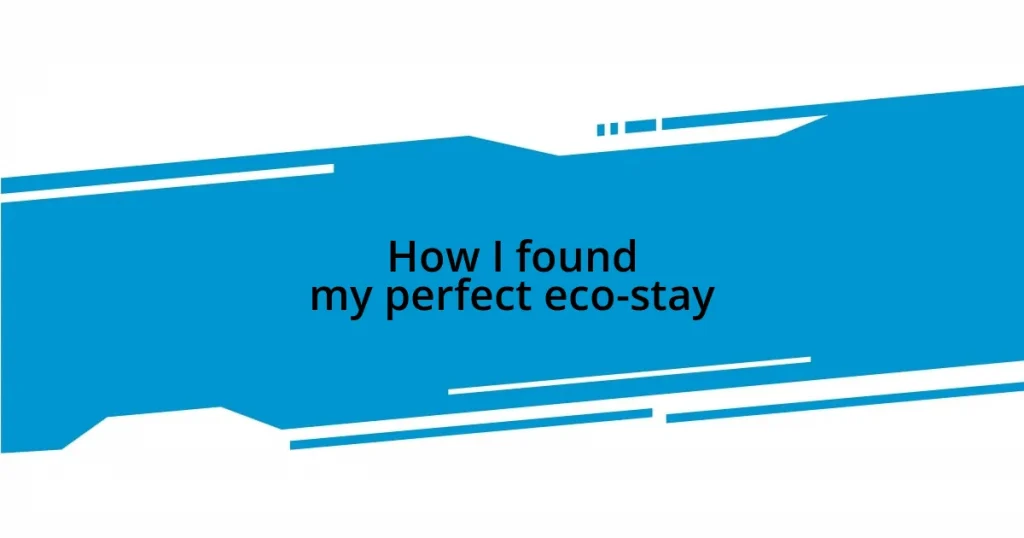Key takeaways:
- Eco-stays provide sustainable accommodations that align with personal values, enhance experiences, and promote environmental education.
- Thorough research on sustainability certifications (e.g., LEED, Green Key) and reading guest reviews are essential for selecting truly eco-friendly stays.
- Choosing eco-locations that emphasize local culture, community involvement, and natural conservation significantly enrich travel experiences.
- Making informed booking decisions based on eco-policies, community support, and genuine sustainability practices enhances personal fulfillment in travel.
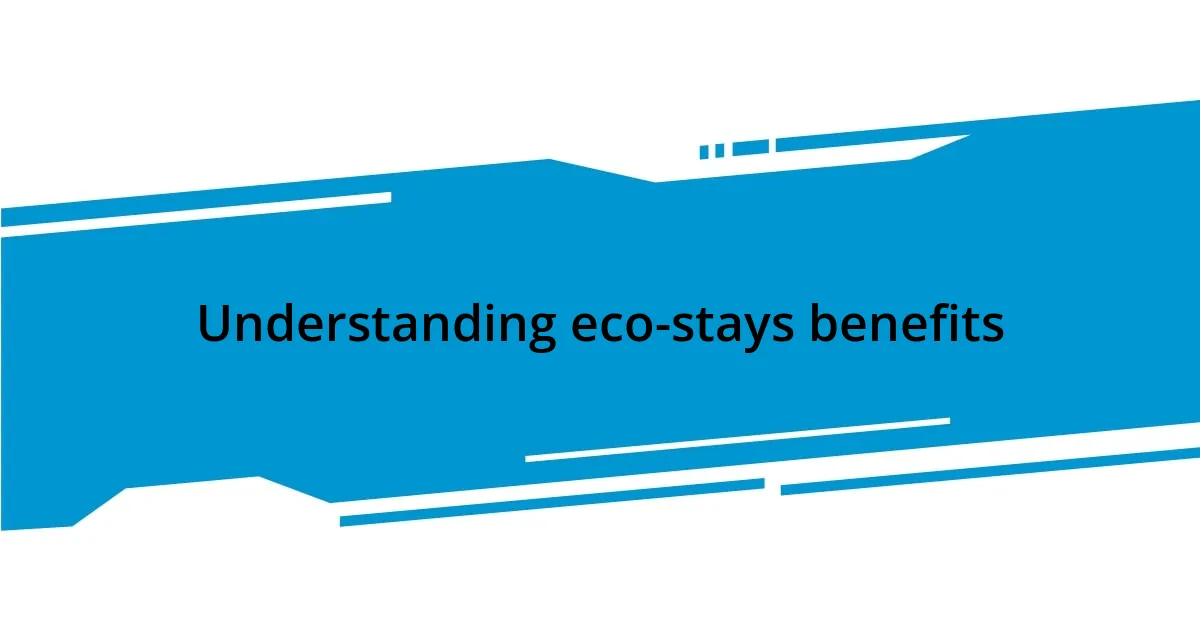
Understanding eco-stays benefits
Choosing an eco-stay was one of the best decisions I ever made. It felt good to know that my accommodations were not just comfortable but also aligned with my values. Have you ever considered how your travel choices impact the environment? Eco-stays often use sustainable practices that minimize waste, conserve energy, and promote local ecosystems, which means you can enjoy your getaway while making a positive contribution.
During my stay at a treehouse built from reclaimed materials, I was struck by the serenity that surrounded me. The hosts were deeply invested in their community, sourcing food from local farmers and using solar energy. It made me think about the ripple effect each choice can have. I noticed how being part of this eco-conscious approach enhanced my experience, allowing me to engage with the landscape in a meaningful way.
I also realized that many eco-stays offer a unique opportunity to connect with nature and the culture of the area. When I participated in a guided hike led by a local naturalist, I learned so much about the indigenous flora and fauna. This enriched my trip, transforming a simple vacation into an educational adventure. Isn’t it rewarding to leave a place knowing you’ve not only enjoyed it but also respected it?
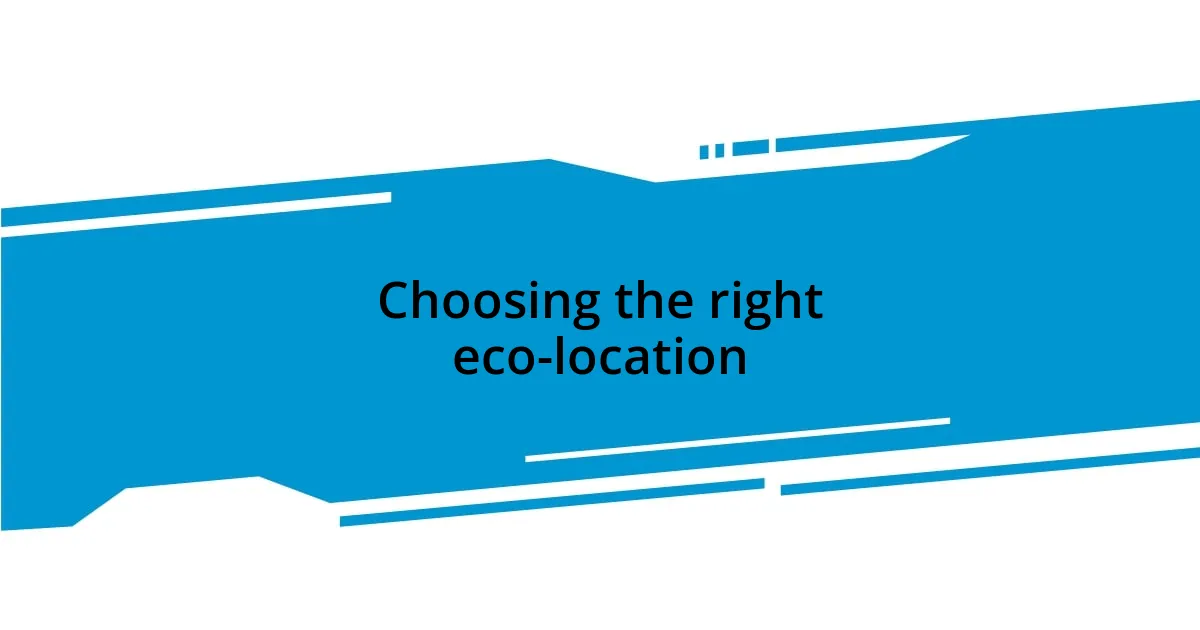
Choosing the right eco-location
When it came to selecting the right eco-location, I first considered how it resonated with my environmental values. I sought places that truly reflected a commitment to sustainability, rather than those simply marketed as “eco-friendly.” For me, this meant looking for locations nestled within nature, emphasizing local culture, and promoting conservation efforts.
Here are some factors that guided my decision:
- Proximity to natural attractions, such as national parks or protected wildlife areas.
- Community involvement in conservation initiatives, so I could experience authentic local engagement.
- Availability of activities that promote environmental education, like workshops or guided tours on sustainable practices.
One memorable experience was selecting a coastal eco-lodge where I watched sea turtles hatch and make their way to the ocean. It was breathtaking to witness this natural process, and it reminded me how crucial it is to choose a location that prioritizes wildlife protection and education. Moreover, engaging with locals, who shared their passion for preserving the environment, deepened my connection to the place. I often found myself pondering how our travel choices can support these vital efforts.
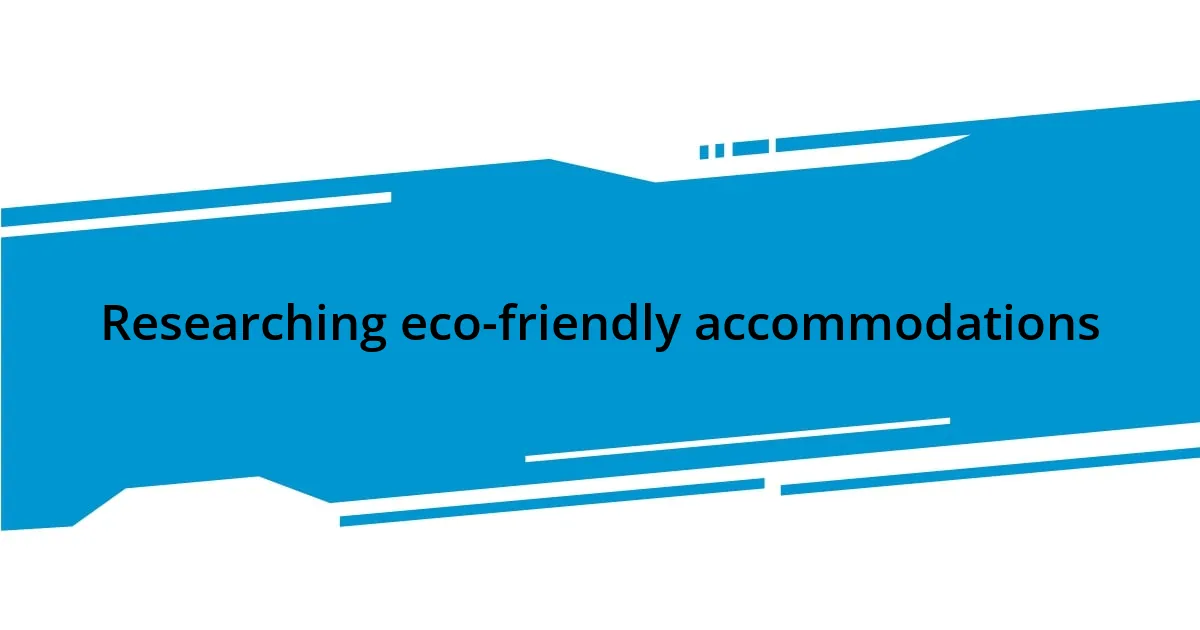
Researching eco-friendly accommodations
Researching eco-friendly accommodations can be a fulfilling adventure in itself. I remember diving into countless reviews and resources, seeking out places that practiced sustainability authentically. For those who might not know, sustainable practices include things like water conservation, minimal waste production, and energy-efficient technologies. It’s all about making informed choices that resonate with your eco-conscious desires.
As I sifted through lists of eco-stays, I found it eye-opening how many accommodations highlighted their green certifications. Certifications such as LEED (Leadership in Energy and Environmental Design) or Green Key can be game-changers in identifying genuinely eco-friendly places. I often found myself torn between stunning views and responsible practices. One particular cabin I discovered in the mountains not only offered breathtaking scenery but also a commitment to preserving the local wildlife through responsible land use. This emphasis on conservation felt like a breath of fresh air.
To make my research efficient, I began comparing various eco-friendly stays side-by-side. I created a simple comparison table to help visualize the options based on location, certifications, and unique features. Having this organized information allowed me to choose accommodations that were not only beautiful but also aligned perfectly with my values.
| Accommodation | Certification | Unique Feature |
|---|---|---|
| Mountain Cabin | Green Key | Local wildlife conservation |
| Coastal Eco-Lodge | LEED Gold | Sea turtle nesting tours |
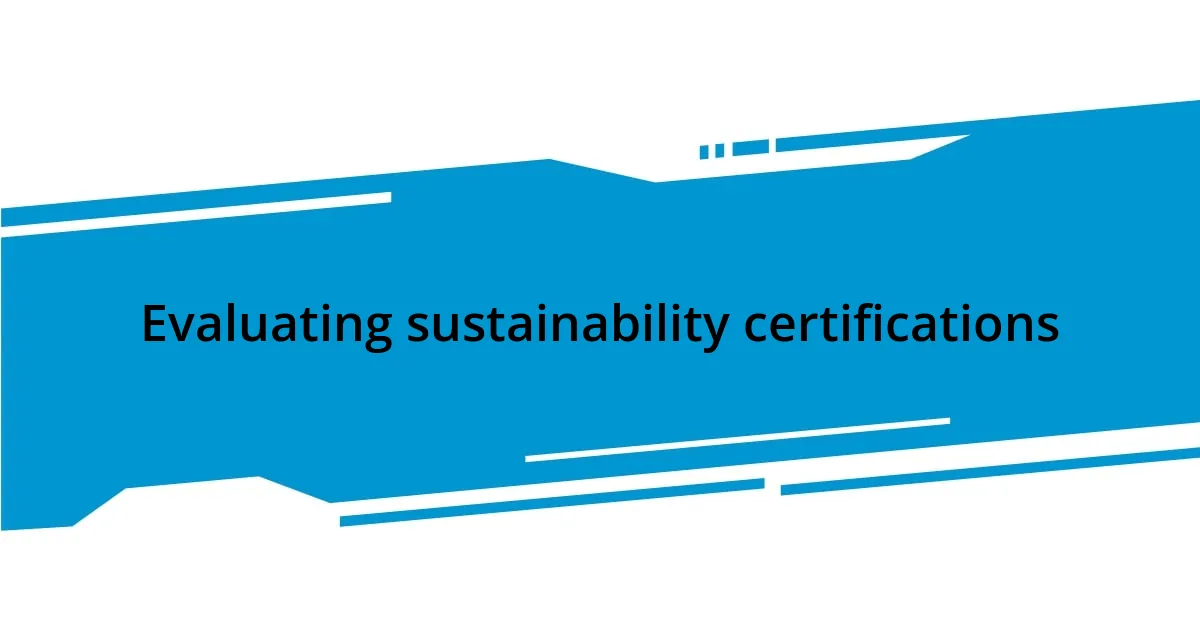
Evaluating sustainability certifications
When diving into sustainability certifications, I quickly realized that not all green labels are created equal. For instance, I often come across places boasting the “eco-friendly” tag, but then I research deeper and find they lack rigorous backing. It’s essential to scrutinize certifications like LEED or EarthCheck, which require comprehensive audits to ensure genuine sustainability efforts. Have you ever been misled by a catchy tagline? I certainly have!
In my search, I took a moment to appreciate the nuanced details behind each certification. After all, it’s not just about the label; it’s about what it signifies. I remember examining a small bed and breakfast that proudly displayed its Green Key certification. I felt a wave of trust wash over me as I read about their meticulous waste management practices and commitment to local sourcing. This experience highlighted how certifications can provide not only assurance but also a roadmap to a property’s ethical practices.
Also, don’t underestimate the power of independent reviews alongside these certifications. I found that while certifications offer official validation, genuine guest experiences can reveal the real story. Trusting my instincts, I once chose a lesser-known eco-stay based on glowing guest testimonials about their efforts to minimize plastic waste. The personal touch of those stories made my choice feel more profound, reminding me why I’m passionate about responsible travel in the first place. Isn’t it incredible how interconnected we can become through our travel choices?

Comparing amenities and services
When comparing amenities and services at eco-stays, I found that the options can vary significantly, shaping the overall experience. For example, some accommodations offer organic soap and shampoo, while others might provide guided nature walks or sustainability workshops. I remember feeling particularly drawn to a lodge that not only had solar panels but also organized beach clean-ups for guests—this level of engagement made my stay feel extra special.
Another aspect that caught my attention was the approach toward food. Many eco-stays emphasize locally sourced meals, which isn’t just good for the planet but also tantalizing for the taste buds! I recall dining at a rustic farmhouse that served farm-to-table dishes, and I could practically taste the difference. Don’t you just love when your meals are as fresh as the experience itself?
Lastly, it’s essential to consider how these services cater to your comfort while being eco-conscious. Some places may offer luxurious amenities, like a hot tub filled with filtered rainwater, but balance it with a commitment to conserving resources. I once stayed at a cozy cabin that had a beautiful outdoor shower—being surrounded by nature while showering was an exhilarating way to connect with the environment. Evaluating these amenities really shaped how I viewed each eco-stay’s commitment to sustainability and enhanced my overall experience.

Reading reviews from previous guests
Reading reviews from previous guests can truly change the game in selecting the right eco-stay. I vividly remember scrolling through pages of testimonials for a quaint eco-lodge in the mountains. One guest described how they were welcomed with homemade organic treats, which instantly made me feel more connected to the property. Doesn’t it feel reassuring to hear about those personal touches from someone who’s been there?
Diving deeper, I also paid close attention to the insights about staff attitudes and customer service. A review mentioned how the staff participated in local conservation efforts and took the time to educate guests. This not only painted a picture of a welcoming environment but also highlighted their genuine dedication to the planet. Isn’t it comforting to know that the people where you stay share your values?
Some reviews even included before-and-after stories, showcasing transformations in eco-practices. One reviewer noted how the management had significantly improved their recycling efforts over the years. I found this particularly inspiring, as it showed me the potential for growth and positive change in the hospitality industry. Isn’t it heartening to support places that actively strive to evolve into better, more sustainable versions of themselves?
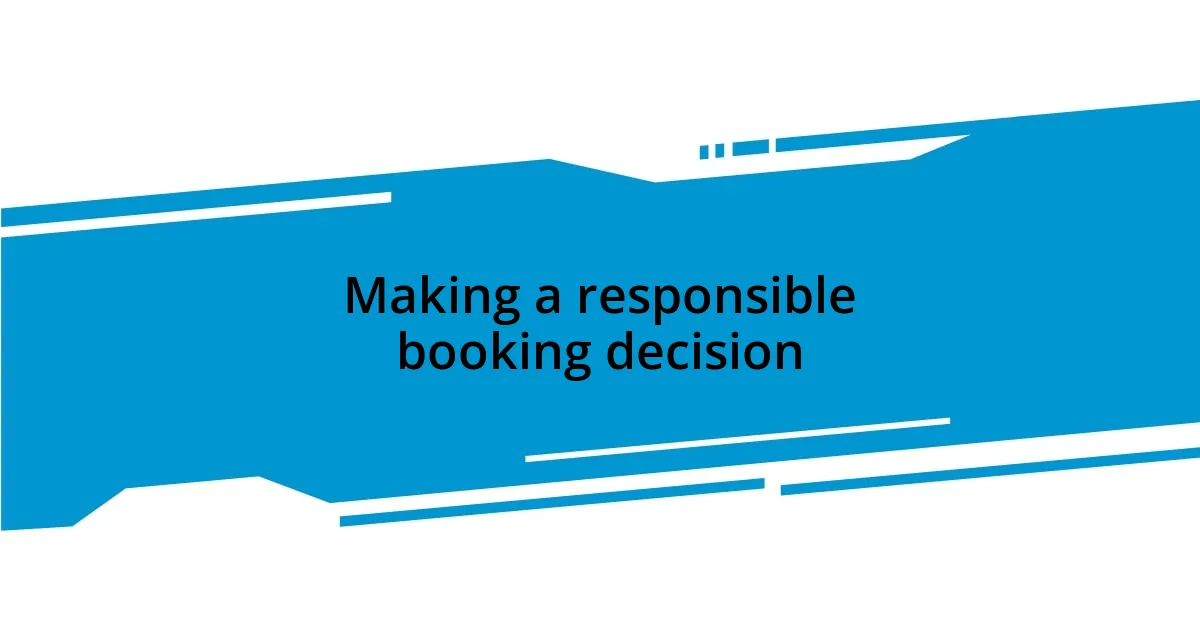
Making a responsible booking decision
When it comes to making a responsible booking decision, I’ve learned that doing a little homework goes a long way. I remember once booking a place on a whim, only to realize it didn’t align with my eco-values at all. Now, I always check if accommodations have certifications from recognized organizations that promote sustainable tourism. I find that this adds an extra layer of reassurance that my stay will be genuinely eco-friendly.
Price alone shouldn’t drive your decision; instead, I like to evaluate the overall impact of my choice. For example, I once opted for a slightly more expensive eco-lodge because it prioritized local community support and ethical labor practices. That investment felt worthwhile, knowing my dollars were contributing not just to my experience, but to the local economy and sustainability efforts as well. Have you ever realized that sometimes spending a bit more can yield invaluable benefits?
Additionally, it’s crucial to consider the eco-policies of the property you’re interested in. I recall switching my plans last minute to stay at a hotel that emphasized reducing single-use plastics. I was thrilled to see their commitment reflected in thoughtful touches like refillable toiletries and reusable water bottles provided for guests. Isn’t it great when a place goes the extra mile not just for comfort, but also for the planet? This kind of dedication often makes the overall experience feel more fulfilling.











